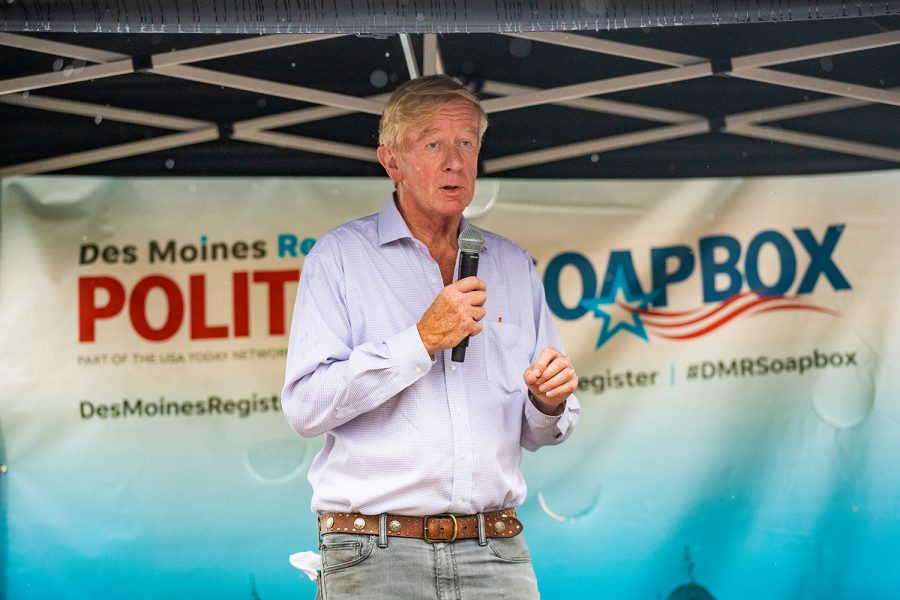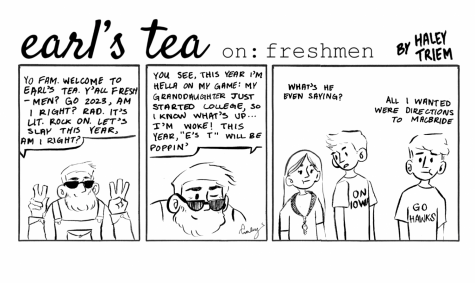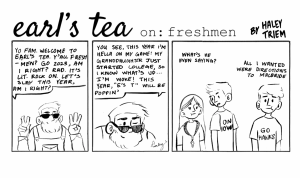Opinion: 20 Out of 20: Which Republicans are challenging Trump and why?
Bill Weld and Joe Walsh are both challenging the president’s re-nomination bid, but have very different reasons why.
Former Massachusetts Gov. Bill Weld speaks at the Des Moines Register Political Soapbox during the Iowa State Fair in Des Moines, IA on Sunday, August 11, 2019.
August 29, 2019
In writing the 20 Out of 20 commentaries, I’ve focused almost entirely on the Democratic presidential-nomination race. That makes sense given that President Trump currently enjoys an approval rating of around 90 percent among his fellow Republicans.
However, just because his renomination is in the bag, that doesn’t mean Trump is without his intraparty detractors. Republicans Former Massachusetts Gov. Bill Weld and former Illinois Rep. Joe Walsh have both announced their candidacy for their party’s presidential nomination.
Both men have virtually no chance of being the party’s nominee. (Even in the scenario where Trump is no longer president by Election Day, Vice President Pence will almost definitely act as the emergency replacement.) But Weld and Walsh both have their reasons for opposing Trump from inside the GOP, so let’s take a look at their pitches.
Weld-ing a moderate GOP
Weld is a former attorney who was elected to two terms as governor of Massachusetts in the ‘90s. A New England Republican, he was and is fairly moderate across the board, especially on social issues. If that whole “fiscally conservative and socially liberal” thing sounds like Weld belongs in the Libertarian Party, that’s because he was. In the 2016 election, he was the running mate of Libertarian nominee Gary Johnson.
Of course, the kind of guy who accepts the vice-presidential nomination of a third party is the kind of guy who likes the “protest vote” media attention, but Weld’s good-faith argument is simple: The Republican Party has moved too far to the right.
In his perspective, sure, Trump is unfit to be president, but the real qualm is that the current GOP is just too extreme. It’s not just the offensive comments or the apparent incapacity to lead; it’s that the policies of the president are simply too extreme.
Weld’s plea is move the party closer to the middle. After all, if the Democrats are having their own radical shift, it follows that it’d be to the GOP’s advantage to appeal to the middle. As he said during his campaign announcement in February, “Like President Reagan, like President Eisenhower, our leaders in government should seek to unite us and make us all proud to be Americans.”
A wishy-Walsh-y politician
I would say Walsh has a similar ideological disagreement with the president, but I’m not sure what Walsh’s ideology is. The one-term congressman from Chicago’s northern suburbs was once the rare pro-choice Republican. Then he was full-send, no-exceptions pro-life. Then he was on the Trump Train. And now he wants to derail it.
Even more so than Weld’s desire to stay in the headlines, Walsh seems, to paraphrase Queen, to go anywhere the wind blows because nothing really matters. This was the guy who said he was voting for Trump in 2016 and “I’m grabbing my musket” in the event of a Trump loss.
So, what’s his deal? Over the past couple of years, Walsh has grown as a top Republican critic of the president. He has attacked Trump through his radio show and social media, calling him “the biggest, baddest, worst iteration of the swamp.”
If we were to take Walsh at his word and not his Twitter following, I’d say Walsh’s primary gripe is that Trump is personally unfit to be president. The lying, corrupt, Calvinball-style of governance isn’t what’s best for the party or the country. Either that, or Walsh is just trying to set up a run at a lower office.
As I said at the top, Weld and Walsh are both the longest of longshots. It seems all but impossible that an anti-Trump coalition will get behind either of them. (The fact that there isn’t a single opposition candidate just splinters whatever anti-Trump sentiment there is.) But that won’t stop them from making a fuss for the next few months.






















